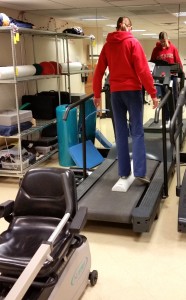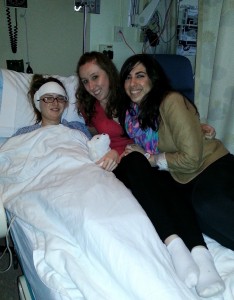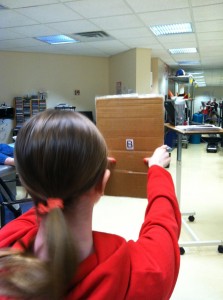Where am I? Where am I? Where am I? Where am I? Where am I? Where am I?
Calm down brain, you’re laying down. Do you remember down?
Where am I? Where am I? Where am I? Where am I? Where am I? Where am I?
Brain, we’ve talked about this.
Where am I? Where am I? Where am I? Where am I? Where am I? Where am I?
Brain, you’re going to have to figure this out. I know. It’s different.
Where am I? Where am I? Where am I? Where am I? Where am I? Where am I?
Down is still down, it’s always been down.
Where am I? Where am I? Where am I? Where am I? Where am I? Where am I?
Suit yourself, I can’t make you.
Lying in a hospital bed with the lights off, my brain is screaming into a void. It doesn’t like the answer, or lack thereof, it is getting in return but it just keeps screaming. This is incessant vertigo. That is how it felt after surgeons cut into my brain to remove an acoustic neuroma. My brain was in a panic, trying to find its place in the world, but the input it typically relies on was damaged first by the tumor and then the surgery. There is no information streaming in from one of the usual sources, and my brain is having trouble coping with its loss.
Symptoms and lingering effects

Rehab to regain my balance, trying to stand on one foot and tap the other in front of me while standing on a piece of foam (treadmill isn’t on). Photo by John Podolak.
Of the 12 cranial nerves, the eighth controls and senses both sound and spatial orientation. An acoustic neuroma is a tumor that grows on this acoustic/vestibular nerve. Mine grew on the right, and so my hearing and vestibular system have both been damaged beyond repair on that side. The vestibular system is a part of your inner ear, and it works in concert with your eyes to sense your spatial orientation, giving you balance. It’s made up of two canals, and small crystals that move when you move and settle in response to gravity’s pull. Since vestibular function is closely linked to your vision, problems with this system are diagnosed by studying eye movements. Together your eyes and your vestibular system signal to your brain to figure out where you are in space.
Vertigo, which I’ve explained as living in a world that won’t stop spinning, is a common symptom of vestibular dysfunction. However, not all vestibular problems result in vertigo, and you can experience dizziness and balance problems that aren’t vertigo. I’ve struggled to find what I feel is an accurate way to describe what vertigo is like, and to differentiate it from other types of dizziness.
Prior to my surgery, I had a positive Dix-Hallpike test, which is used to diagnose vertigo. For this test you put on goggles that block out light and lean back with your head unsupported and turned all the way to the right or to the left. If you have vertigo, it will be triggered by this maneuver because, without input from your eyes, your brain struggles to orient itself.
Immediately following the surgery my vertigo was more intense that I’ve ever felt it, to the point that I was constantly nauseated. That is when I started describing it as a world that never stops spinning, or constantly riding Space Mountain. I had been told to expect this, so, unpleasant as it was, at least it wasn’t a surprise. The spinning lessened everyday after the tumor was removed, and, around the four-week mark post-surgery, the vertigo mercifully stopped. I recently had another Dix-Hallpike test and didn’t register a response, which is great.
I still have difficulty balancing, which is evident when I’m walking or going up and down stairs. If I try to walk with my eyes closed, it’s game over. Still, this is an improvement from the way things were in the hospital, when I couldn’t walk without assistance. I may wobble around like I’m hammered, but I can do it on my own. Vestibular rehab, which is a type of physical therapy, should help retrain my brain to balance. In some ways it feels like my brain is having an existential crisis, and, while I would like it to decide what it wants to do with itself, I know it takes time to adapt.
From physical to mental
Since the surgery was pushed earlier, it was only after the procedure that I started to process anything. Recovering from this procedure left me a lot of time to think, because I found it hard to focus on anything around me. Eyes closed, quiet, but awake, is a state I spent a lot of time in. Doing a lot of thinking, but not necessarily coming to terms with my feelings. People keep asking me if I’ve cried, or if I’ve gotten angry, but I’m not sure I’m sad or angry. I’ve had moments of course, and I get frustrated with myself when I struggle to do simple tasks, but I’m largely in good spirits. I feel lucky and loved more than anything else.
My worst moments come when I start getting down on myself for getting down. I’m impatient. I want to be back to normal. I want my life back. I want to be able to do things for myself. I want to walk without having to reach out and steady myself. I want to go back to work. I want my body back, because, in a lot of ways I feel like my body has been hijacked. Then I get annoyed with myself, because I’m going to get all of these things. I’m going to make a complete recovery, and it is only a matter of patience until I get there. I know I’m allowed to feel frustrated, but I try hard to maintain a realistic perspective about what has happened, and all the things that will happen because I’m still here.
That leaves things progressing incrementally. I’m anticipating being back on my feet sometime in June, and am looking forward to returning to the science communication world. I’m still doing a lot of thinking, and have a lot of emotional processing left to do, but I get a little bit closer to coming to terms with it everyday. As I’ve been reflecting, there are a few things that I’ve taken away from the whole experience which are not particularly earth-shattering, but are certainly foremost in my mind.
Things to take away

Before I left the hospital, with my sorority sisters. One of us isn’t looking their best. Photo by John Podolak.
First, as much as this happened to me, it happened to everyone who loves and cares about me. I’m so grateful to my friends and family for dropping everything to be at my side through all of this, and I think it is important to remember that this was traumatic for them. My parents keep talking about what I went through with the surgery, but I can’t imagine what they went through, watching the clock, waiting for news as an entire day slipped away, far longer than anyone predicted. I didn’t come out of the operating room until well after 10pm, and I know friends scattered across different cities were up watching their phones, waiting to hear how it went. I missed the majority of the drama either unconscious or blissfully unaware thanks to painkillers, so I think they had it worse. I’ve experienced such an outpouring of love and support, and have been so well taken care of – but caretakers need care too.
Second, never underestimate the power of an excellent nurse. I had two absolutely fantastic surgeons, and my primary care physician is awesome, but I also had terrific nurses. The nurses were always there, answering the majority of my questions (or helping me get the answers) for everything from tracking down my missing shoes to explaining what kind of medications I was taking and why. I know my Mom made a lot of late night phone calls to the hospital to check on me, and the nurses always fielded her inquiries in a calm and positive way. My nurses were all pretty awesome, and it made an unpleasant hospital stay that much more bearable.
Third, young and completely healthy isn’t protection against a medical emergency. You may be fine now, but life could have a curve ball headed your way, and you need insurance. I can’t even begin to imagine this experience without health insurance. I haven’t received the bill yet, but the costs associated with my care are going to be astronomical. Knowing I’m lucky enough to have primary and secondary insurance to help cover those costs has been such a relief.
Fourth, I have a new appreciation for what it is like to not be able to do something. I know I’ve said before that I can’t do something when really either I won’t, or just don’t want to do it. Having now experienced what it is like when you really can’t do simple things, I don’t think I’ll be mischaracterizing my abilities again. I also have a new appreciation for what a luxury it is to be able to sweat the small stuff. If your life is such that you can get worked up about things like traffic or a last minute meeting, you’re doing pretty darn well. There is so much that now seems like a waste of time or energy. It’s a trite truth that you don’t know what you have until you almost lose it, but I certainly have a renewed appreciation for all the good there is in my life.
The last thing I’ve been cogitating on (for now) is how important it is to trust yourself. I knew that something was wrong with me, long before I was actually diagnosed. I dismissed my symptoms for a long time, suffering through them rather than facing the reality that something serious could be wrong. Naturally, I’ve been blaming myself that things became as dire as they did, but I’m coming around to the idea that beating myself up about it isn’t exactly productive. This started out as dizziness and headaches, which could have been so many things besides an acoustic neuroma. It’s not surprising I and everyone I talked to about it brushed aside the idea of a tumor. It’s important to be your own advocate, and find a doctor that will listen to you. The first hearing test I took said I was fine, even though I knew I wasn’t. I’m so grateful to my primary care physician for listening to all of my symptoms and pursuing my case with a CT. She might not have been the one making the cuts, but I don’t think it’s a stretch to say she saved my ability to move my face by making sure I was diagnosed properly.
What I’m taking away most is that you can’t hide from your health, and if you try, it’s likely to come crashing through your life like a hammer. I’m just glad I’ve got a chance to pick up the pieces.

Thx for sharing your experience if you don’t mind I’ll put a link on my website to yours. My site is dedicated to helping other AN patients, unfortunately it’s in dutch so it probably won’t help you. However your story will help others overhere.
With kind regards< Danny
My Fellow Brain Tumor Survivor!,
Thanks for sharing. Wonderful story. Especially, of course, the ending…so far. Hard to imagine right now, but yeah, “normal’ is out there, not too far off. And soon enough the little stuff will feel like big stuff again, and the gigantic perspective you have on things will get tucked into your library and overtaken by the day to day. The appreciation for things that is so much more acute now will dim back to normal too. The wonderful wrapped-inside-it love and family and community you feel, will bump up against all the normal hassles and rejections that conspire to chill that warmth. And yet, they will all still be there…the love and perspective and Bigger Picture…touchstones available to the new and improved you that you have become!
YAY for you!
P.S. I wasn’t a shithead in the ICU when I woke up but I was on the edge of puking for 24 hours. EWWWWW! Mostly from being under anesthesia that long. And I couldn’t talk because they had intubated me awkwardly and my tongue had been squished and was swollen. and THAT freaked me the hell out when I woke, ’cause I thought that was permanent damage!
Wow, amazing story, thanks for sharing, and good luck!
Thank you for sharing your courageous story, you are a true inspiration for those diagnosed with AN. All the best with recovery.